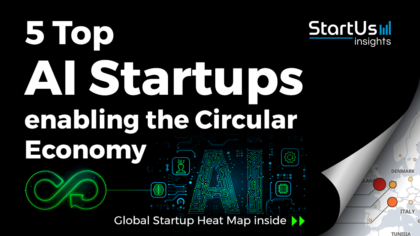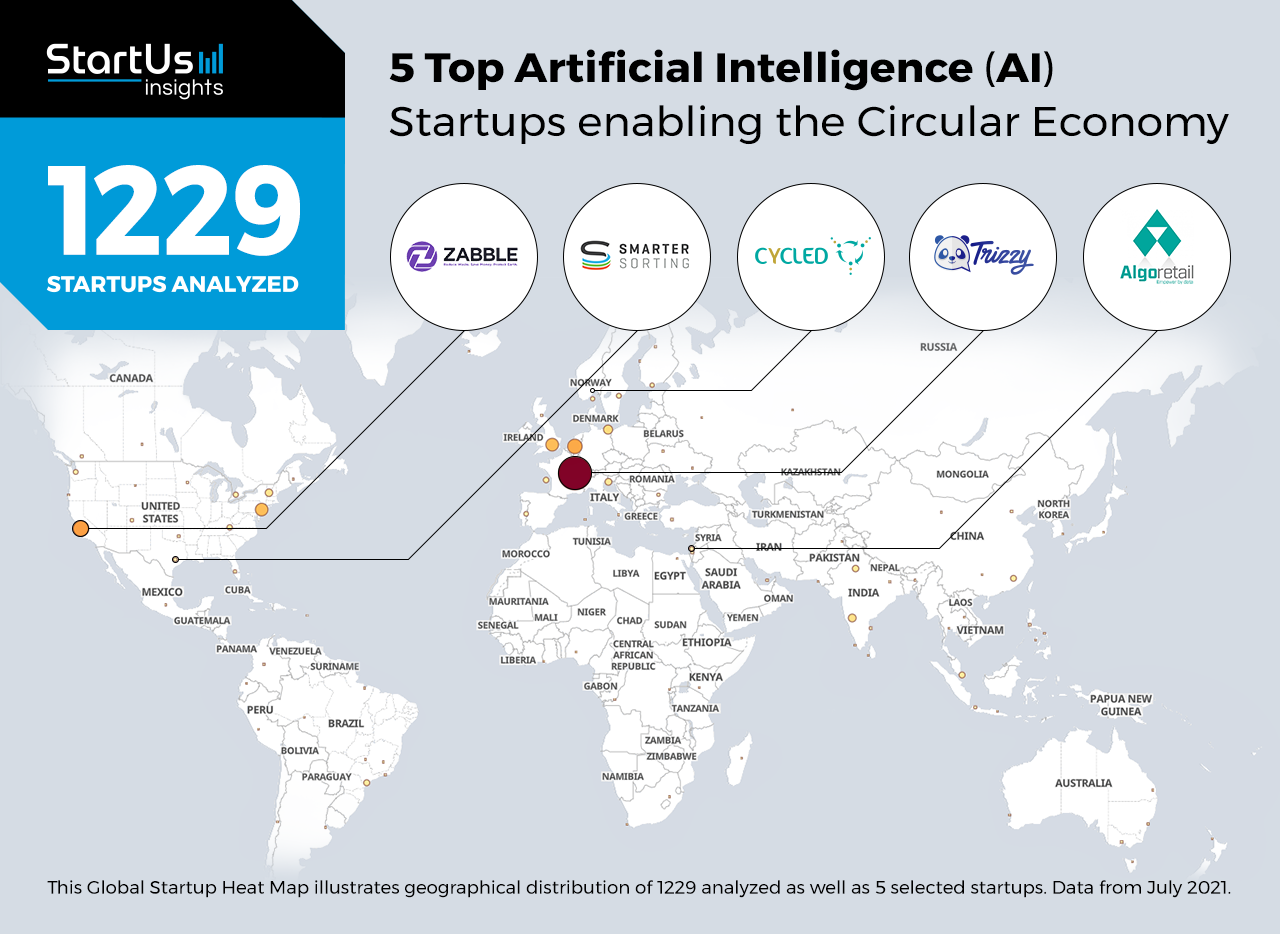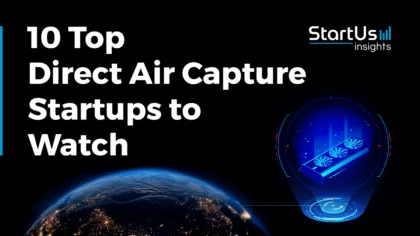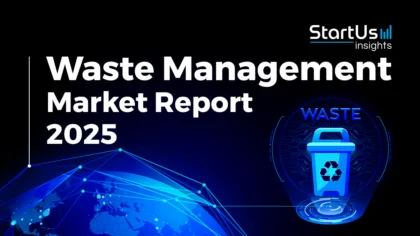Accelerate Productivity in 2025
Reignite Growth Despite the Global Slowdown
Staying ahead of the technology curve means strengthening your competitive advantage. That is why we give you data-driven innovation insights into the circular economy. This time, you get to discover 5 hand-picked Artificial Intelligence startups advancing the circular economy.
Global Startup Heat Map highlights 5 Top Artificial Intelligence Startups advancing the Circular Economy out of 1.229
The insights of this data-driven analysis are derived from the Big Data & Artificial Intelligence-powered StartUs Insights Discovery Platform, covering 2.093.000+ startups & scaleups globally. The platform gives you an exhaustive overview of emerging technologies & relevant startups within a specific field in just a few clicks.
The Global Startup Heat Map below reveals the distribution of the 1.229 exemplary startups & scaleups we analyzed for this research. Further, it highlights 5 artificial intelligence startups that we hand-picked based on criteria such as founding year, location, funding raised, and more. You get to explore the solutions of these 5 startups & scaleups in this report. For insights on the other 1.224 solutions, get in touch.
Smarter Sorting develops a SaaS Waste Management Platform
In large warehouses and inventories, products often spoil, resulting in them going directly to landfills when some of them could have been recycled instead. This not only contributes to more waste but also incurs significant losses for businesses. To solve this problem, startups are developing waste management solutions aiming to reduce inventory waste.
US-based startup Smarter Sorting develops a cloud-based Software-as-a-Service (SaaS) waste management platform for retailers. The solution uses AI to provide up-to-date information on inventories, such as the attributes of a product and its packaging. This allows retailers to better understand which products are eligible for recycling, which are suitable for donations, and so on. These insights cut waste volumes and reduce disposal costs.
Algoretail reduces Food Waste with AI-Based Sales Forecasting
Supermarkets and grocery stores generate a lot of food waste as they deal with various perishable products such as produce, meat, and dairy items. It is very common for the stores to overstock as they cannot accurately predict how much they will sell of a given item. Thus the excess products expire and are then sent to landfills. Therefore, startups are offering AI-based solutions that predict sales accurately and hence, reduce food waste.
Israeli startup Algoretail uses machine learning to automate grocery retail stocking procedures from the supplier, through the stockroom and onto the shelf. The automation tool, Algoretail IO, offers data-driven sales forecasting, thus, reducing wastage of perishable FMCG food items including bread, butter, milk, etc. Moreover, Algoretail IO provides granular reporting with graphic representations of insights along with customizable alerts regarding products that are about to expire.
Cycled Technologies AS provides AI-Powered Recycling Solutions
Not all recyclable items should be tackled the same way. This is why sorting recyclables is important for effective waste management. As a result, startups are providing solutions that sort waste automatically — for example, smart bins utilize self-sorting technology to do the same. Further, most of these solutions come with a mobile application that provides insights into the waste collected and sorted.
Cycled Technologies AS is a Norwegian startup that provides AI-powered recycling solutions, namely a smart bin and a mobile application. The smart bin works through self-sorting technology that utilizes AI to sort recyclable waste. The mobile application provides a personalized recycling profile and a logistics tool for waste collectors. It also rewards its users for disposing of waste, in the form of CycledTokens, which are stored in the application’s wallet and can be redeemed as entities into prize draws.
Trizzy builds an AI-powered Digital Assistant for Waste Management
People often do not have enough knowledge regarding how to sort waste properly – especially e-waste such as exhausted batteries — and end up throwing it away along with other household garbage. To tackle this issue, technology startups are developing AI-led digital assistants like chatbots that not only provide information regarding sorting waste correctly but also help locate nearby recycling centers and share tips on how to achieve zero waste, among other features.
French startup Trizzy offers a waste management chatbot assistant for corporate companies and communities. It is deployed on websites, social networks, and mobile applications. Through Artificial Intelligence, it recognizes various kinds of waste and answers users’ questions about how to deal with a particular kind of waste, collection schedules, composting, nearby recycling centers, zero waste, and more. Additionally, Trizzy offers a reuse marketplace available to users via its platform, further enabling circularity.
Zabble uses Machine Learning to Automate Waste Data Collection
Thanks to increased consumer demand for circularity, companies of all sizes are striving to achieve zero waste. The first step of the same is collecting and analyzing the amount of waste a company generates. Hence, startups are offering cloud-based platforms for assisting organizations to automate waste data collection and provide insights into the same, thus enabling a smooth and fast waste management system.
Zabble is a US-based startup that enables hospitals & corporate campuses to achieve zero waste through its cloud-based enterprise mobile platform, Zabble Zero. The solution digitizes waste data collection and maintenance processes for waste management professionals and connects back-office systems. It uses machine learning algorithms to provide supervisors with real-time insights and recommendations that accelerate the processes. Moreover, by utilizing this platform, companies send less waste to landfills and lower their carbon footprint.
Discover more Circular Economy Startups
Startups such as the examples highlighted in this report focus on Bio-based Materials, Remanufacturing, Blockchain as well as Waste-to-Resource Solutions. While all of these technologies play a major role in advancing the Circular Economy, they only represent the tip of the iceberg. To explore more technologies, simply get in touch to let us look into your areas of interest. For a more general overview, you can download one of our free Industry Innovation Reports to save your time and improve strategic decision-making.


![Uncover the Top 10 Cleantech Trends & Innovations [2025-2026]](https://www.startus-insights.com/wp-content/uploads/2025/07/Cleantech-Trends-SharedImg-StartUs-Insights-noresize-420x236.webp)





